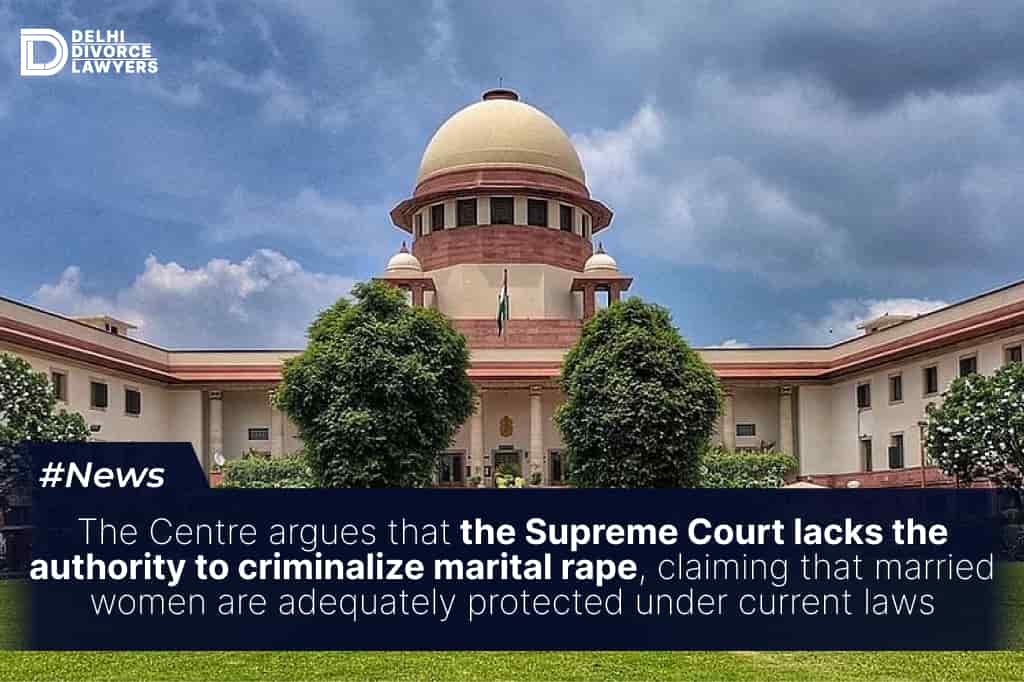The Centre said that it is not as if a woman’s consent is obliterated by marriage, but only that consent violations within marriage would not attract rape law; there are other remedies.
On Thursday, the Union government submitted an affidavit to the Supreme Court opposing petitions seeking the criminalization of marital rape in India [Hrishikesh Sahoo vs Union of India and anr]. In the response filed by advocate AK Sharma, the Union Home Ministry defended the current rape laws, which exempt sexual relations between a husband and wife from being categorized as rape. The Central government maintained that this issue is primarily a social concern with wide-ranging societal implications and argued that, even if marital rape were to be criminalized, it falls outside the Supreme Court’s purview to implement such changes.
“The (issue) cannot be decided without proper consultation with all the stakeholders or taking the views of all the States into consideration … the act colloquially referred to as ‘marital rape’ ought to be illegal and criminalized. The Central Government asserts that a woman’s consent is not obliterated by marriage, and its violation should result in penal consequences. However, the consequences of such violations within marriage differ from those outside it,” the affidavit said.
The Centre argued that a violation of consent should be treated differently depending on whether it happens within or outside of marriage. It acknowledged that marriage inherently carries an expectation of mutual sexual access between spouses, but emphasized that this does not give a husband the right to force his wife into sexual activity against her will. However, the Centre maintained that extending anti-rape laws to such situations could be seen as excessive and disproportionate.
The Centre emphasized that Parliament has already established various legal provisions to safeguard a married woman’s consent within marriage. These include Section 498A of the Indian Penal Code, which penalizes cruelty against married women, laws addressing offenses against a woman’s modesty, and protections under the Protection of Women from Domestic Violence Act, 2005.
“The sexual aspect is but one of many facets of the relationship between husband and wife, on which the bedrock of their marriage rests … Given the nature of the marital institution in our socio-legal milieu, if the legislature is of the view that, for preservation of the marital institution, the impugned Exception should be retained, it is submitted that it would not be appropriate for this Hon’ble Court to strike down the Exception,” the affidavit added.
The counter-affidavit was filed in response to multiple petitions calling for the criminalization of marital rape.
The act colloquially referred to as ‘marital rape’ ought to be illegal and criminalized … However, consequences of such violations within marriage differ.
Central government
The Centre criticized the petitioners for viewing marriage solely as a private institution, describing this perspective as one-dimensional. It argued that the relationship between a married woman and her husband should not be treated the same as other situations. The Centre emphasized that it is the legislature’s responsibility to define the legal ramifications of sexual abuse based on various circumstances. The Central government contended that current laws do not ignore consent between spouses; rather, they address it differently within the context of marriage. This differentiation, the Centre argued, aligns with Article 14 (right to equality) of the Constitution by preventing the comparison of two fundamentally different scenarios—sexual relations within marriage and those outside of it. The Union government reiterated its commitment to protecting women’s liberty and dignity, asserting that there is no need to criminalize marital rape, as there are already “appropriately tailored penal remedies” in place.
Marital rape is not classified as “rape” under Exception 2 of Section 375 of the Indian Penal Code (IPC). A similar provision is present in the newly enacted Bharatiya Nyaya Sanhita (BNS), which replaced the IPC on July 1 of this year. In 2022, the Delhi High Court issued a split verdict regarding the criminalization of marital rape, after which the case was escalated to the Supreme Court in September of the same year.
Note: The heading of the story initially said “decriminalise” instead of “criminalise”. The error has been corrected and is regretted.

